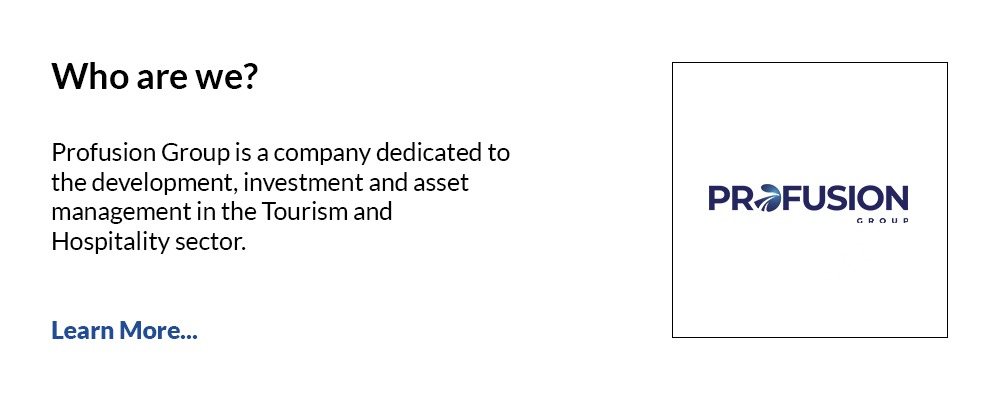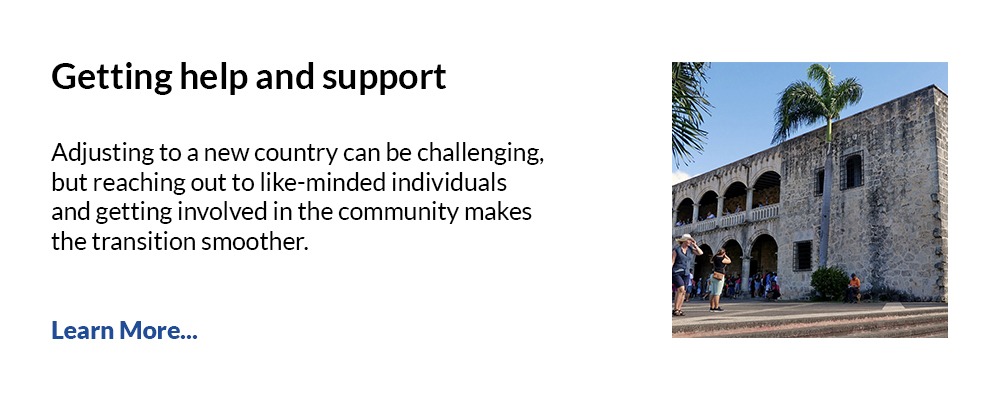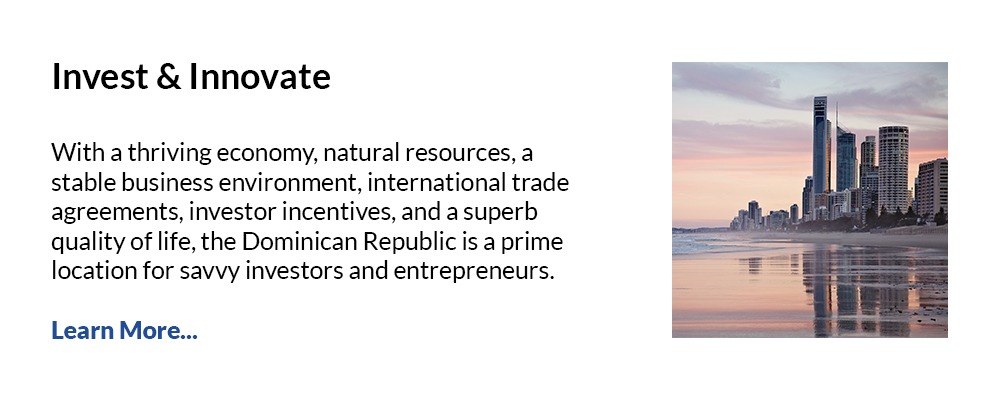Principal Investment Sectors
The Dominican Republic’s thriving economy, natural resources, a stable business environment, international trade agreements, investor incentives, and superb quality of life make it a prime destination for savvy investor and entrepreneurs. As an investor in the Dominican Republic, you have access to the world’s market and the ability to grow your business while living in paradise!
The Dominican Republic is one of the leading tourist destinations in the world with many natural resources perfect for investing in the tourism industry. With the strongest tourism industry in the region, the tourism sector has worked to diversify offerings and improve access to high-quality areas throughout the country.
There are laws in place that benefit investors in the tourism sector. Law 158-01 of Tourist Incentive, modified by Law 195-13, grants investors broad tax exemptions for a period up to 15 years for new projects that meet a set of guidelines (outlined under Key Market Data.
The Tourism Development Council (CONFOTUR) is a government institution in charge of examining and approving the applications of investors and companies wishing to take advantage of the provisions of the Tourism Incentive Law (Law 158-01), and to supervise the investor’s and/or company’s compliance.
There are five main touristic areas in the Dominican Republic booming with investment potential. The five top regions are Punta Cana and Bavaro, Santo Domingo and La Ciudad Colonial, Boca Chica and Juan Dolio, La Romana and Bayahibe, and Samana and Las Terrenas. Scattered around the island, each of these regions has their own unique offerings for tourists.
The Dominican Republic is dedicated to developing infrastructure, maintaining security, increasing facilities, and promoting the country to continue increasing tourism and attracting foreign investors.
Investing in any tourism or real estate project requires conducting market research, strategizing, and creating a plan of action. We advise you to consult us for advice on how to get started and let us get you in touch with individuals to help you along the way.
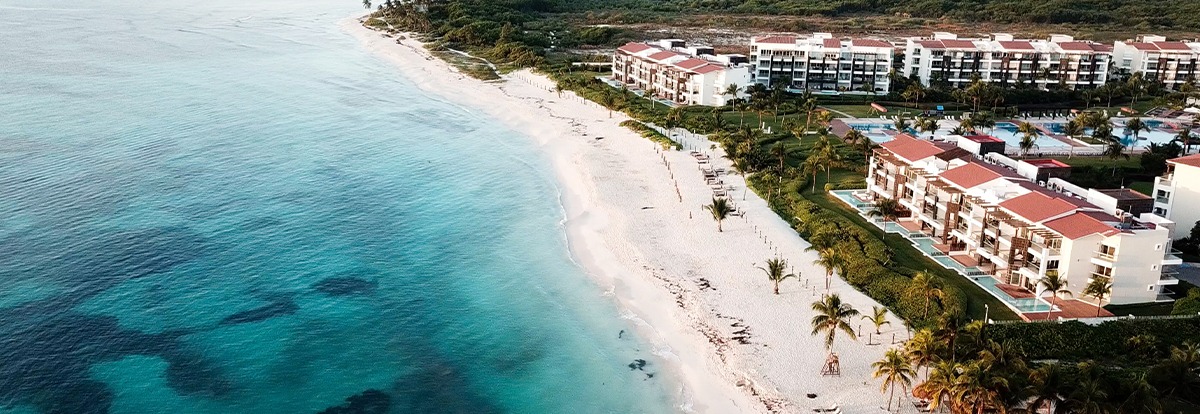

The Dominican Republic created the National Free Zones Council (CNZFE) to oversee and serve the free trade zone sectors across the country. CNZFE is a government agency created by Law 8-90 and is composed of representatives of both the public and private sectors. Representatives are responsible for outlining comprehensive promotion policies and for the overall development of the free zone sectors. The CNZFE must also regulate and abide by Law 8-90 for each free trade sector in the Dominican Republic.
The primary objective of the CNZFE, and why it is helpful towards investors, is to keep the Dominican Republic as a regional leader in free trade by adjusting actions and policies according to international trade regulations and keeping track of opening markets and the globalization of the world’s economy. The CNZFE has promoted growth and development of free trade zones, improving the levels of productivity and competitiveness across established companies. The commitment to promotion and development policies has enhanced the business climate of free trade zones, strengthening, diversifying, and attracting new global investments.
There are many benefits and incentives applicable to Free Trade Zones according to Article 24 of Law 8-90 benefitting investors in the sector. The following list of benefits and incentives at 100% exception:
- Payment of income tax established by Law 5911, of May 1962, and its modifications, referring to companies by shares.
- Payment of construction tax, loan contracts, and the registration and transfer of real estate as of the establishment of the corresponding free zone operator.
- Tax payment of the incorporation of commercial companies or increase of their capital.
- The payment of municipal taxes created that may affect these activities.
- Of all import taxes, tariffs, customs duties and other related taxes, which affect raw materials, equipment, construction materials, parts of buildings, office equipment, etc., all of them intended to: build, enable or operate in the free zones.
- Of all existing export or re-export taxes except those established in subparagraphs (f) and (g) of Article 17 of the Law.
- Tax on patents, on assets or assets, as well as the Transfer Tax on Industrialized Goods (ITBIS).
- Consular fees for all imports destined to operators or companies in free zones.
- Payment of import taxes, related to equipment and utensils necessary for the installation and operation of economic dining rooms, health services, medical assistance, day care, entertainment, or amenities and any other equipment the promotes the welfare of the working class.
- The payment of import taxes for transport equipment that are freight vehicles, garbage collectors, minibuses, minibuses to transport employees and workers to and from work centers.
When it comes to the manufacturing sector, the Dominican Republic offers advantages and benefits for those looking to enhance the sectors development and business activities. In the Dominican market, you can find qualified labor at competitive costs, a modern infrastructure, and preferential access to the United States, Europe, Central America, and the Caribbean markets.
Manufacturing incentives:
- Law 8-90 regarding Free Trade Zones in the Dominican Republic and its Application Regulations
- Law 56-07 declaring the sectors belonging to the textile, garment and accessory chain, among others, as a national priority; and creates a national regulatory regime for these industries.
- Law 392-07 on Competitiveness and Industrial Innovation
- Special customs control regime.
- Tax incentives up to 100%.
- Exemption of consular fees for all imports destined to operators or companies in free zones.
- Exemption from payment of import taxes on transport equipment.
- Additional incentives in strategic areas of the country.
- Agile process of registration and accreditation of delivery times in the services corresponding to the exonerations of equipment, machinery, and raw materials.
- Local financing available for companies installed in free zones.
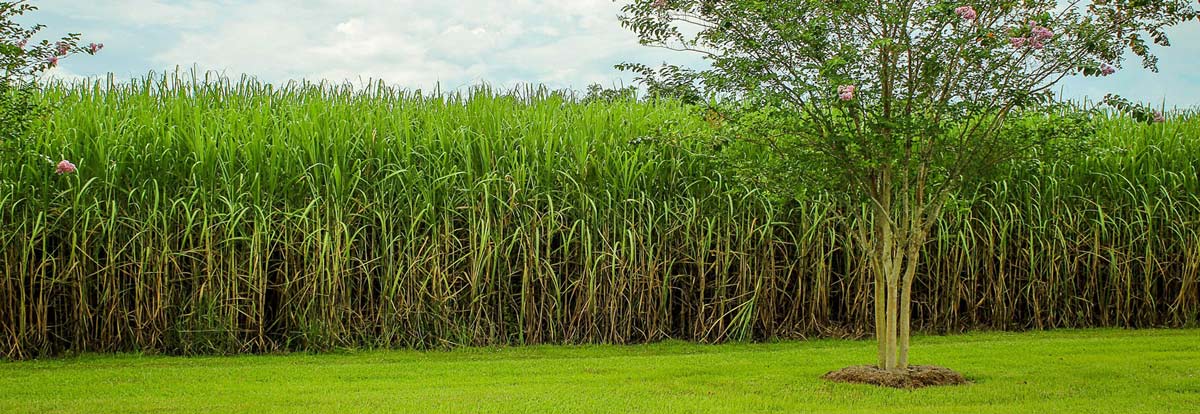

Over the last decade, the real estate sector in the Dominican Republic has experienced remarkable growth with new offers in varied housing, commerce, offices, and tourism development projects. The recent real estate sectors growth can be attributed to the prosperous economy and an increase in the middle class in the country.
Venturing into a real estate project, investors enjoy incentives enforced by the Dominican government as well as access to a large market of international buyers with significant purchasing power.
In recent years, the financial system was subject to weakness in the stock market, and a basic savings account didn’t provide attractive incentives. Investing in real estate, even during times of economic or financial crisis, is a profitable investment because the value of your investment capital increases over the long term meaning that over time, the property generates income itself. This income can provide a financially secure environment and sense of tranquility for you and your family.
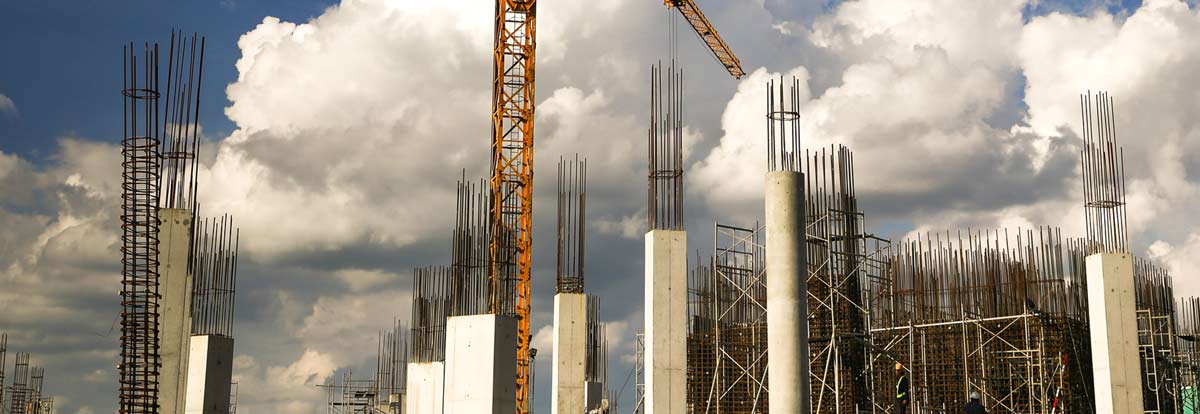

The Dominican Republic contains excellent agricultural potential due to its natural resources, fertile soils, and lands suitable for cultivation. The diversity in soils and climates across the country make the Dominican Republic a leading destination for agricultural production and investment.
Traditional agricultural products include sugarcane, coffee, cocoa, and tobacco. Non-traditional agricultural products include mainly fruits like bananas, oranges, avocados, pineapples, mangos, and melons. The Dominican Republic is among the leading suppliers of the United States markets and certain countries of the European Union.
In the northern parts of the island, coffee is grown as well as rice, oil, and garden products while in the southern parts legumes are largely produced. The southern parts of the island also grown vegetables and bananas. The eastern region produces sugarcane and livestock. The island is so diverse; therefore, different crops can grow, creating an endless potential for investors looking to get into the agro-industry.
Law 84-99 on Incentives for the Promotion of Exports establishes the entry of certain goods into customs territory with the suspension of import duties and taxes from abroad and free export zones to be re-exported within a period not exceeding 18 months from entry into customs territory. This law creates an incentive for investors looking to get involved in the agro-industry by ensuring premier access to the world’s market.
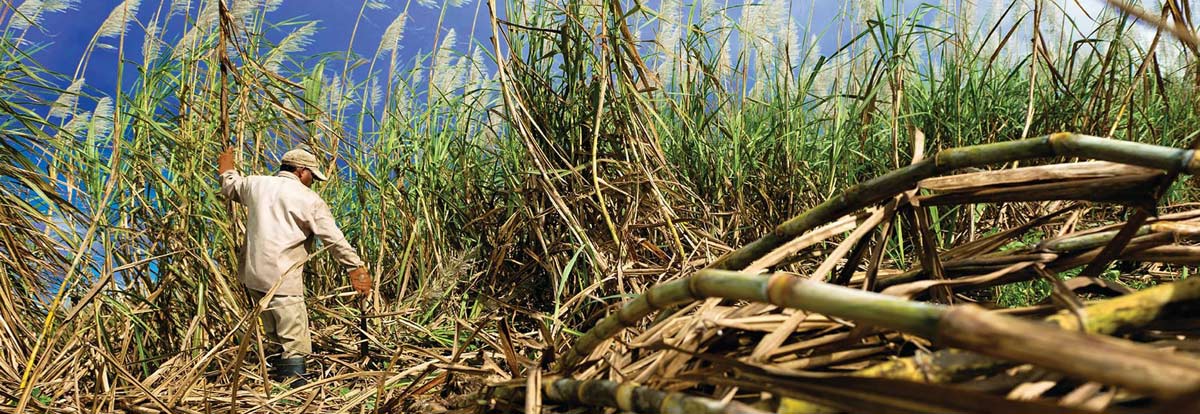

The Dominican Republic offers fantastic investment opportunities in the mining sector with an increased level of gold and marble production and of main construction aggregates. This increase has added value to the mining sector and its attraction towards foreign investors. For this reason, the mining sector represents one of the primary sources of income for the Dominican Republic.
Mining is the second economic activity with the highest level of foreign direct investment (FDI), representing 17.3% of FDI in the period 2010-2017.
The benefits of foreign capital invested in local projects also translate into job creation, increased exports, greater competitiveness, greater tax collection and foreign exchange.
The exports of the mining sector are those that register the greatest growth in the period 2010-2017 in the Dominican Republic, with an increase equivalent to 48.0 per year per year, versus 0.3 percent of the growth of agricultural exports and 3.5 per cent of the industrial exports, according to the figures of the Central Bank.
At the end of 2017, mineral exports accounted for 39.9 percent of national exports and 17.5 percent of the country’s total exports.
There is even more untapped potential in the Dominican Republic mining sector with various mineral deposits and reserves. Among gold and marble, there are also reserves of silver, nickel, bauxite, limestone, granite, and salt. The island also exploits semiprecious stones for jewelry design like amber and larimar. In addition, the Dominican Republic is ready for new investments in search of natural gas and oil.
The mining sector is considered a high priority for the national economy. The government carries out various programs to promote the sustained development of this sector in the country. The mining industry in the Dominican Republic attracts foreign investors because of its attractive variety of mineral resources.
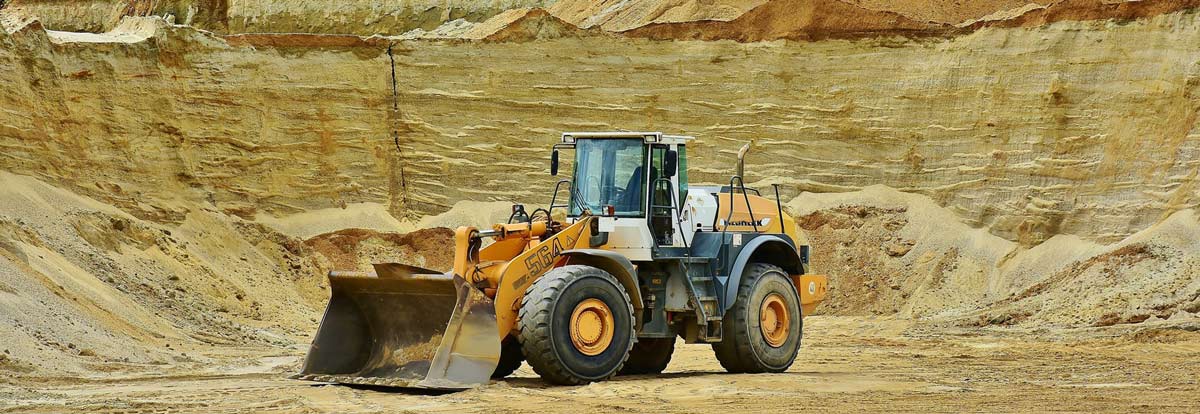

In 1995, franchises began making an appearance in the Dominican Republic. Though it started with fast food chains, there has been an increase in the type of franchises in the market. With changes made to Law 173, governing the protection of agents and distributors, and the enactment of the Dominican Republic-Central American Free Trade Agreement (DR-CAFTA), the franchise sector has expanded at a rapid pace appealing to foreign investors.
The breakdown of franchises in the Dominican market are as follows: Services 25%, Trade 22%, Restaurants 20%, Education 14%, Personal Care 9%, Entertainment 5%, and Other 5%.
The geographical breakdown of franchises in the Dominican Republic are as follows: Greater Santo Domingo 44%, Santiago and El Cibao 21%, the Eastern Region 19%, and the Southern Region 16%.
The franchise sector has a significant impact on the local economy providing jobs nationwide. While 60% of franchises are of Dominican origin, 40% are foreign, creating additional demand for domestic production. The franchise sector alone has generated more than 70,000 jobs nationwide, and with continued foreign investments, the number is expected to grow.



